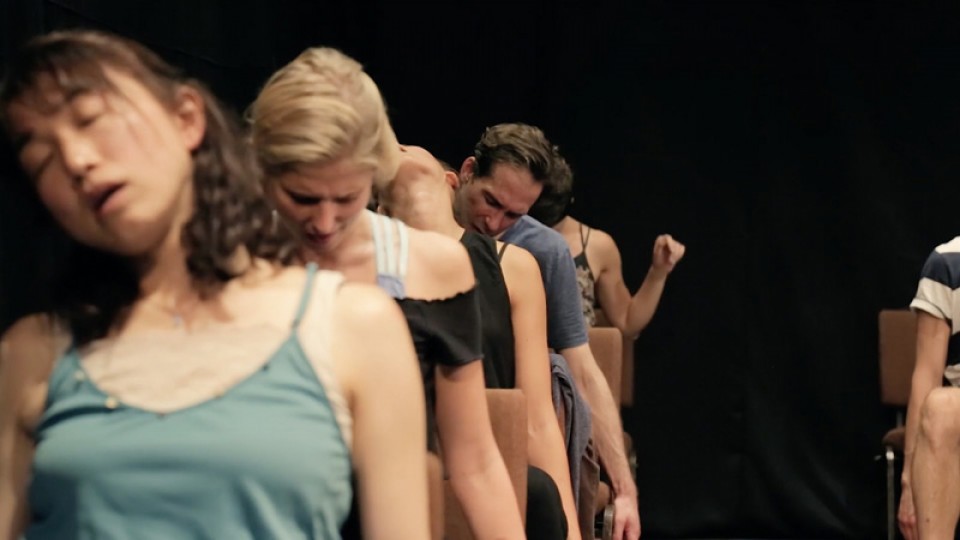
Opening
19 August: re-opening after lockdown
Opening hours
Wed- Sat 12- 5pm
tongue
Henry Bradley
Ends 29 August 2020
We are very excited that after the long interruption during lockdown this project is re-opening again!
There are some changes how you will visit PS² and you can see our guidelines here.

‘tongue’ shows a trilogy of films that observe and
dramatise niche educational programmes and surgical procedures designed to
improve English pronunciation and entrepreneurial performance within globalised
contemporary work environments.
In the films, speech and behaviour are recognised as bodily sites that
can, and must, be adapted in order to perform sufficiently in a
climate of expected English language skills and self-employment requirements.
They document and depict the act of learning as participants adapt themself to
alternate or dominant forms of behaviour, whether through private courses in GLOSSOLALIA
and Rhythming, or in the case of Frenulum, physical surgery.
Specifically, intentionally, and potentially unavoidably, the gaze of the
videos sits on the threshold of asking when these services become spaces in
which the participant develops agency or alternatively becomes habituated.
Aware it’s neither solely one or the other, the works situate themselves on the
threshold of this dichotomy, asking how these educational or medicinal
situations can help reflect the complex social, economic, and political,
pressures, anxieties and desires at play in wider aspects of society. As these
are highlighted, the reasons for the participants attending or undergoing the
service become clearer, in turn revealing how these reasons have
consequentially opened up new gaps in the educational and medical market.
Rhythming, 34m, HD Video, 2018
Rhythming updates Harun Farocki’s ‘The Interview’ (1996),
re-staging a Small Talk and Storytelling class for entrepreneurs on a specifically
built stage in an old East German cotton-mill warehouse. It highlights how
practices of storytelling, commonly adopted by large scale advertising
projects, have now become frequent practices by which the contemporary
individual worker can sell and understand themselves.
A drum track accompanies the moment the workers and teacher move behind
the scenes, denaturalising the educational situation taking place; they now
occupy the infrastructure of the film logistics, such as changing clothes for
new scenes or being paid for their labour.
Furthermore, working fluidly across forms of documentary and fiction,
with both actors and non-actors, all three films use the conventions of
observational cinema and theatre as tools to stage, re-stage and navigate
through the different levels of performance taking place in the subject matter
itself. With both education and medicine as commonly private spaces, the camera
takes on a voyeuristic feeling even when the class, such as in Rhythming,
has obviously been re-staged.
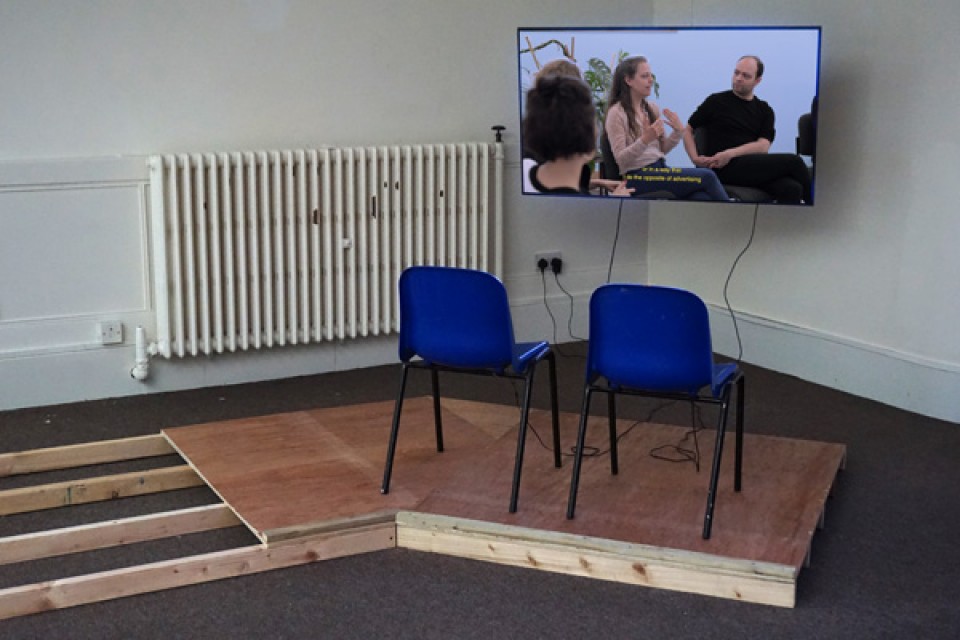
Set-up for: 'Rhythming', HD Video, 34m, 2018
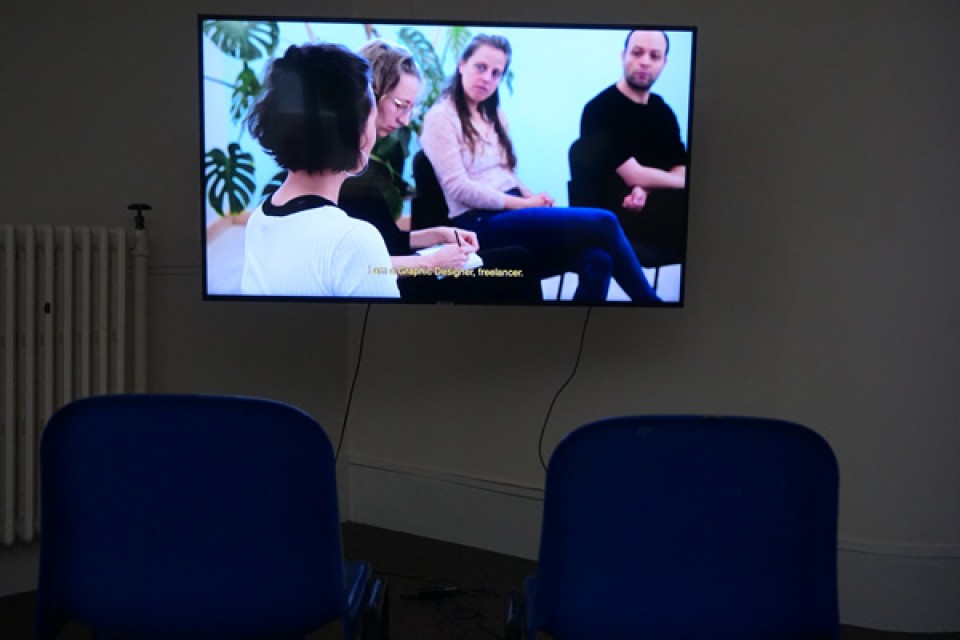
Set-up for: 'Rhythming', HD Video, 34m, 2018
GLOSSOLALIA, 53m, HD Video, 2017
GLOSSOLALIA parallels a method acting class, in which actors
are trained to access and utilise their unconscious and irrational nature,
alongside an Accent Softening Course for Business, whereby international
workers learn the ‘Standard English’ accent so as to help further their careers
in the UK.
Interspersed throughout are a series of scenes, including children
learning phonics and reciting an absurd poem inspired by Jorge Luis Borges, and
a contortionist rehearsing, that further questions our relationship to
language, meaning and pedagogy. Set on a single stage in East London, the film
creates microcosm aspects of contemporary Britain and modern work at the time
of filming.
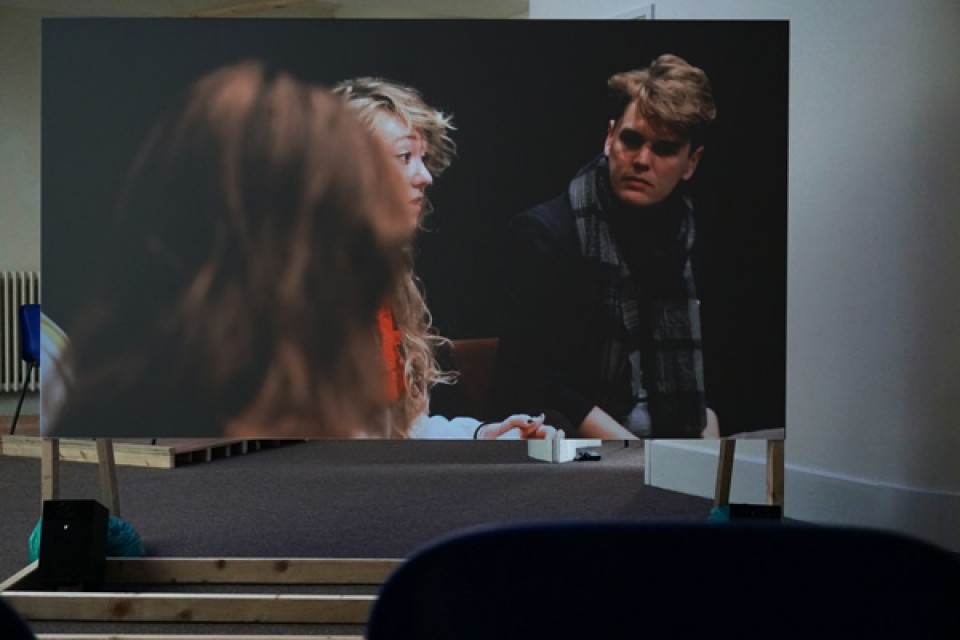
GLOSSOLALIA, 53m, HD Video, 2017
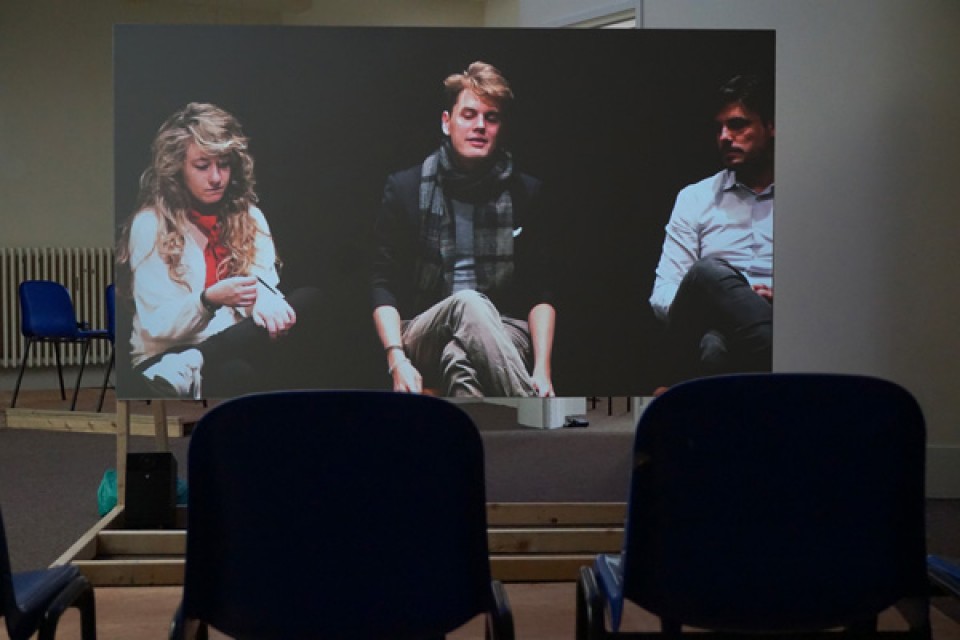
GLOSSOLALIA, 53m, HD Video, 2017
GLOSSOLALIA from Henry Bradley on Vimeo.
Frenulum, 4m, HD Video, 2020
Frenulum dramatises a real-life controversial operation,
following eight children as they perform imaginary tongue surgery on a member
of their group, in order to help them speak phonetic sounds from the English
language better.
The operation (called a lingual frenectomy) is common across the globe.
However, in certain countries such as South Korea, where demand for English is
extremely strong, it is used for a distinctive reason of helping children reach
specific English sounds better. Widely disputed by health professionals and
local authorities as a suitable procedure for such a goal, the practice
represents some of the pressures to perfect the English language for future
career and life opportunities. It also signifies a wider contemporary phenomena
at play of disregarding medical advice in favour of socio-political views,
pressures and narratives.
Frenulum, evacuating any adults from the situation,
dramatises this encounter, leaving open the question as to why the children are
self-performing such a procedure, and in the process politicises notions of
children’s games and play. The film also asks what it means to become part of a
group, and at what thresholds we may justify or participate in physically altering someone's body to conform to certain group attributes, whether necessary or
ideological.

Frenulum, 4m, HD Video, 2020
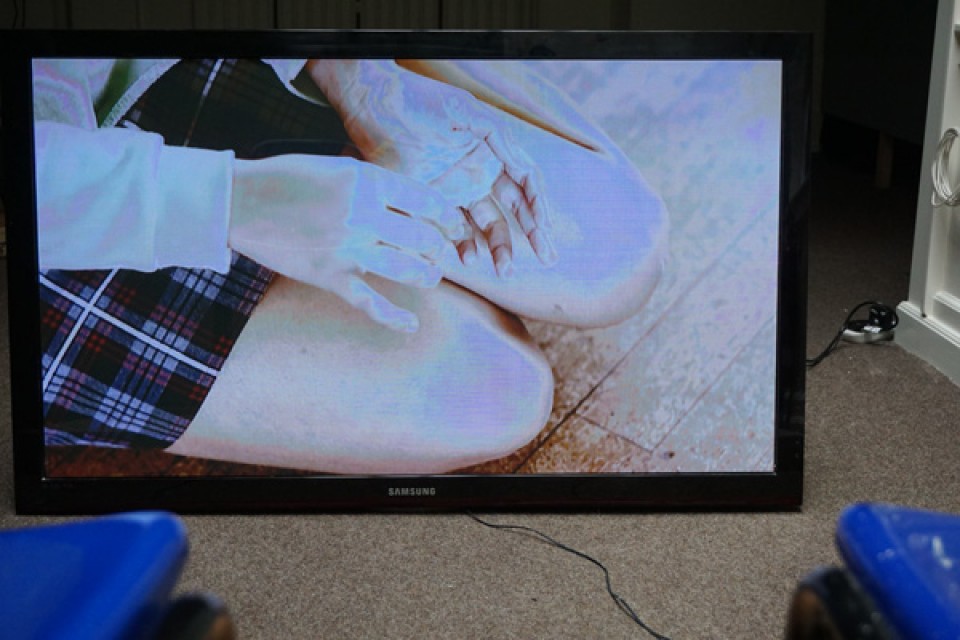
Frenulum, 4m, HD Video, 2020
Unfortunately, we can't show Frenulum as it has to be first screened on BBC
In the exhibition at PS², the works are installed on three sculptural
platforms that allude to the aesthetics and form of common educational
environments. However, they also serve to position the viewer, and more
specifically the act of looking, as a central component to cinema, elevating
the audience to become a set of bodies to be viewed as much as the work itself
whilst they watch.
Henry Bradley (b. 1991) works in video,
performance, and installation. His research and work deals with the physical
manifestation of economic ideals, managerial techniques and environmental
shifts on the human voice, speech, and behaviour. In 2017, he graduated from the
Centre for Research Architecture, Goldsmiths University, and has undertaken
exhibitions, commissions, and residencies across Europe with, ICA, London; BBC,
UK; Jerwood Arts, London; Fondazione Prada,
Venice; HALLE 14 Centre for Contemporary Art, Leipzig; Arts Catalyst, London; AUF AEG, Nuremberg;
UK Young Artists, UK; Resina, Italy; Salt Project Collective, Italy;
ArtLicks, London.
Image top: Henry Bradley- GLOSSOLALIA, film still

